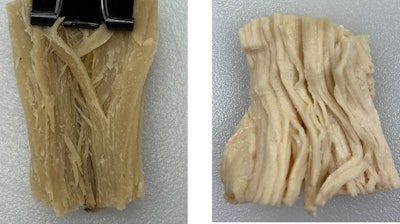
Fewer nutrients found in the plant proteins used to create meat alternatives, such as soybeans, are accessible by human cells compared to traditional animal proteins like chicken, revealed a new study published in the Journal of Agricultura and Food Chemistry.
“By using an in vitro test, we found that peptides from the digestion of chicken proteins were smaller and have higher hydrophilicity,” Dr. Osvaldo Campanella, study co-author, professor and the Carl E. Haas Endowed Chair in Food Industries at The Ohio State University.
Advocates of plant-based proteins say that the meat alternative is healthier than animal proteins, citing the high protein levels and low levels of undesired fats found in plants. However, some lab tests suggest that the proteins from plant proteins don’t break down into smaller chains of amino acids called peptides as well as the ones from meat.
An in vitro model of human cell digestion
In the new study, the researchers compared the differences in human cell digestion between a plant-based protein model made of soy and wheat gluten and chicken in in an in vitro test.
The results showed that the plant-based substitute peptides were less water-soluble than that of chicken, making them harder for the human body to digest.
“Our work in using in vitro tests shows that plant-based meats provides many essential amino acids as required by human that may complement well in a balanced diet. Whether the difference in peptide absorption will have much impact on health require further studies that incorporate in vivo research and eventually clinical trials,” explained Campanella
The researchers hope to use these findings to develop a better plant-based protein.
“We are currently working on the improvement of protein nutrition from meat analogs in addition to texture and other organoleptic properties by changing formulations and processing conditions. This work opens a door on the nutritional properties of meat analogs,” Campanella added.
“Concerning their nutrition, definitely more work must be conducted in order to know exactly the fate of proteins in different types of meat analogs and their bioavailability in humans.”
















